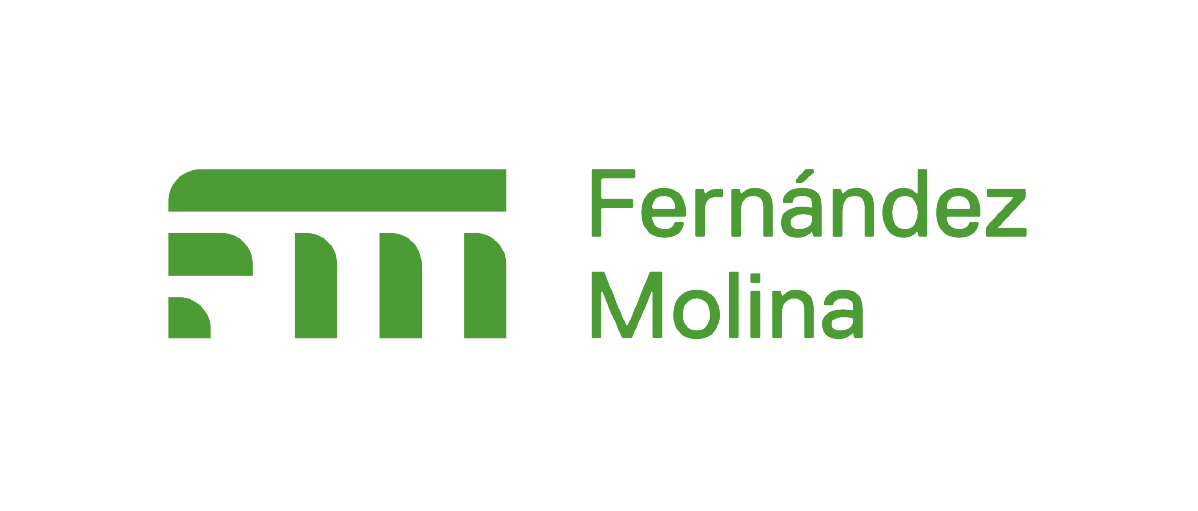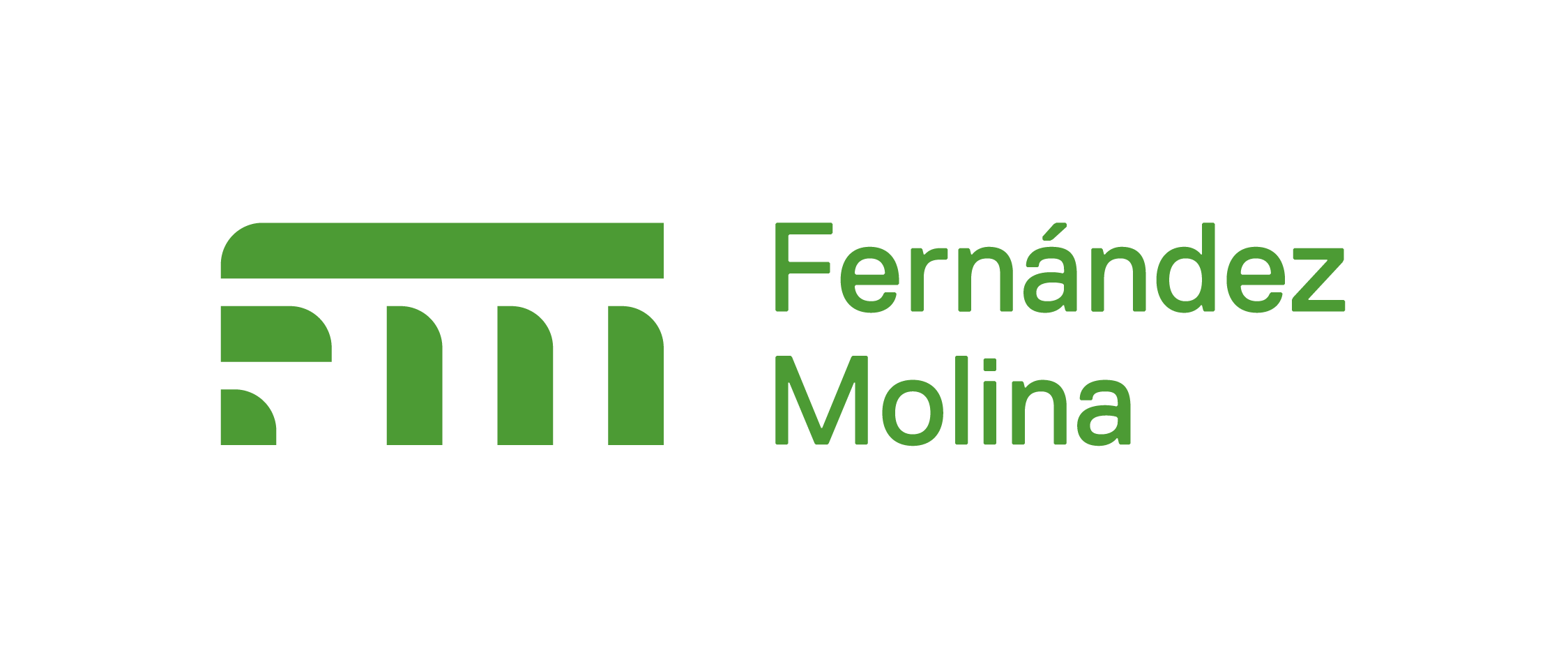Legal Notice
To comply with the provisions of Law 34/2002, of 11 July, on services of the information society and electronic commerce, the general information details of this website are indicated below: FERNANDEZ MOLINA OBRAS Y SERVICIOS, S.A.
Owner: FERNANDEZ MOLINA OBRAS Y SERVICIOS, S.A.
Address Calle Apolonio Morales, 29. 28036 – Madrid
Contact: info@fernandezmolina.com or +34917589720 (fax: +34 915473892)
Registry Data: Registered in the Madrid Mercantile Registry in Volume 5510, book 0, page 149, section 8, sheet no. M-90191.
CIF: A28414654
COOKIES POLICY
Our website (www.fernandezmolina.com) uses a technology called “cookies”, to be able to collect information about the use of the website.
What are “cookies”?
A cookie is a small text file that is stored in your browser when you visit almost any website. Its usefulness is that the website can remember your visit when you go back to that page. Cookies usually store information of a technical nature, personal preferences, personalization of content, usage statistics, links to social networks, access to user accounts, etc. The aim of the cookie is to adapt the content of the website to your profile and needs, without cookies the services offered by any page would be significantly reduced. If you wish to consult more information about what cookies are, what they store, how to eliminate them, deactivate them, etc.
What is a cookie?
A cookie is a harmless text file that is stored in your browser when you visit almost any website. The utility of the cookie is that the website will be able to remember your visit when you return to navigate that page. Although many people do not know, cookies have been used for 20 years, when the first browsers for the World Wide Web appeared.
What IS NOT a cookie?
It is not a virus, a trojan, a worm, a spam, a spyware, or a pop-up window.
What information does a cookie store?
Cookies do not usually store sensitive information about you, such as credit cards or bank details, photographs, your ID or personal information, etc. The data they store is of a technical nature, personal preferences, personalization of content, etc.
The web server does not associate you as a person but your web browser. In fact, if you usually browse with Internet Explorer and try to browse the same website with Firefox or Chrome you will see that the website does not realize that you are the same person because it is actually associating the browser, not the person.
What kind of cookies are there?
– Technical Cookies: These are the most elementary and allow, among other things, to know when a human or an automated application is browsing, when a
anonymous user and a registered one, basic tasks for the operation of any dynamic web.
– Analysis cookies: They collect information about the type of navigation you are doing, the sections you use most, products consulted, time of use, language, etc.
– Advertising cookies: They show advertising according to your navigation, your country of origin, language, etc.
What are own and third-party cookies?
Own cookies are those generated by the page you are visiting, and third-party cookies are those generated by external services or providers such as Facebook, Twitter, Google, etc.
What happens if I disable cookies?
To help you understand the extent to which you can disable cookies, here are some examples:
– You will not be able to share content from that website on Facebook, Twitter or any other social network.
– The website will not be able to adapt the contents to your personal preferences, as it usually happens in online stores.
– You will not be able to access the personal area of that website, such as My Account, or My Profile or My Orders.
– Online stores: It will be impossible for you to make purchases online; they will have to be by phone or by visiting the physical store if you have one.
– It will not be possible to personalize your geographical preferences such as time zone, currency or language.
– The website will not be able to perform web analytics on visitors and web traffic, which will make it difficult for the website to be competitive.
– You will not be able to write on the blog, upload photos, post comments, rate or rate content. The website will also not be able to know if you are a human or an automated application that publishes spam.
– You will not be able to show sectorized advertising, which will reduce the advertising income of the web.
– All social networks use cookies, if you disable them you will not be able to use any social network.
Can cookies be deleted?
Yes. Not only can they be deleted, but they can also be blocked, either in general or for a specific domain.
To delete cookies from a website you must go to your browser settings and there you can search for the cookies associated with the domain in question and proceed to delete them.
Cookie settings for most popular browsers
Here is how to access a particular Chrome browser cookie. Note: these steps may vary depending on your browser version: Note: these steps may vary depending on your browser version:
1. Go to Settings or Preferences through the File menu or by clicking on the customization icon at the top right.
2. You will see different sections, click on the option Show advanced options.
3. Go to Privacy, Content Configuration.
4. Select All Cookies and Site Data.
5. You will see a list of all cookies ordered by domain. To make it easier for you to find the cookies for a particular domain, enter part or all the address in the Search for Cookies field.
6. After making this filter one or more lines will appear on the screen with the cookies of the requested web. Now you only must select it and press the X to proceed to its elimination.
To access the Internet Explorer browser’s cookie settings, follow these steps (they may vary depending on the browser version):
1. Go to Tools, Internet Options
2. Click on Privacy.
3. Move the slider until the desired privacy level is set.
To access the Firefox browser’s cookie settings, follow these steps (they may vary depending on the browser version):
1. Go to Options or Preferences depending on your operating system.
2. Click on Privacy.
3. Under History choose Use a custom history setting.
4. Now you will see the option Accept cookies, you can turn it on or off according to your preferences.
To access the cookie settings of theSafari for OSXbrowser follow these steps (they may vary depending on the browser version):
1. Go to Preferences, then Privacy.
2. Here you will see the Block Cookies option to set the type of blocking you want to do.
To access the cookie settings of the Safari for iOSbrowser follow these steps (they may vary depending on the browser version):
1. Go to Settings, then Safari.
2. Go to Privacy & Security, you will see the Block Cookies option to set the type of blocking you want to do.
To access the browser’s cookie settings for Android devices follow these steps (they may vary depending on the browser version):
1. Run the browser and press the Menu key, then Settings.
2. Go to Security and Privacy, you will see the option Accept Cookies to check or uncheck the box.
To access the browser’s cookie settings for Windows Phone devices, follow these steps (they may vary depending on the browser version):
1. Open Internet Explorer, then More, then Settings
2. You can now check or uncheck the Allow Cookies box.
Cookies used on this website
Following the guidelines of the Spanish Data Protection Agency, we proceed to detail the use of cookies on this website to inform you as accurately as possible.
This website uses the following own cookies:
– Session cookies, to ensure that users who write comments on the blog are human and not automated applications. This is how we combat spam.
This website uses the followingthird-party cookies:
– Google Analytics: Stores cookies to compile statistics on the traffic and volume of visits to this website. By using this website, you are consenting to the processing of data about you by Google. Therefore, the exercise of any right in this sense should be done by communicating directly with Google.
– Social networks: Each social network uses its own cookies so that you can click on buttons such as Like or Share.
Who uses the cookies on this website?
In the entity we work with other companies that help us obtain statistics on visits, pages viewed and other indicators of the activity of our website.
In the entity we never save the personal data of our users, except for the IP address as described in this Notice, unless you want to register, voluntarily, in one of the sections enabled for this purpose within the website, in order to make use of the services we make available and receive information on promotions and content of interest.
Deactivation or elimination of cookies
At any time, you may exercise your right to deactivate or delete cookies from this website. These actions are performed differently depending on the browser you are using.
Additional information
– Neither this website nor its legal representatives are responsible for the content or the veracity of the privacy policies that the third parties mentioned in this cookie policy may have.
– The web browsers are the tools in charge of storing the cookies and from this place you must make your right to delete or deactivate them. Neither this website nor its legal representatives can guarantee the correct or incorrect handling of the cookies by the browsers.
– In some cases it is necessary to install cookies so that the browser does not forget its decision not to accept them.
– In the case of Google Analytics cookies, this company stores the cookies in servers located in the United States and undertakes not to share them with third parties, except in cases where it is necessary for the operation of the system or when the law requires it. According to Google, it does not save your IP address. Google Inc. is a company adhering to the “Privacy Shield Agreement” which guarantees that all data transferred will be treated with a level of protection in accordance with European regulations. You can find detailed information on this subject at this link. If you want information about Google’s use of cookies.
– If you require further information on the cookies used on this website, please send an e-mail to the following address: info@fernandezmolina.com.
Consent
By browsing and continuing the website you are consenting to the use of the above-mentioned cookies, for the periods indicated and under the conditions contained in this Cookie Policy.
You can obtain more information about us through our legal notice or by sending an e-mail to info@fernandezmolina.com.

